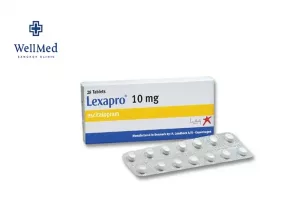Yes, Zoloft can mess with your sleep, but you don’t have to spend nights staring at the ceiling wondering why. In most cases the insomnia is short‑lived, and there are plenty of practical tricks you can try before deciding to switch medications. Let’s break it down together, step by step, and give you the confidence to get a good night’s rest again.
Quick Answer Overview
Does Zoloft cause insomnia? – Absolutely, it can. About 1 in 10 people on sertraline (the generic name for Zoloft) report trouble falling or staying asleep, especially during the first few weeks of treatment.
- It’s often linked to how Zoloft raises serotonin levels, which can interfere with melatonin production.
- The effect is usually strongest at the start of therapy and tends to fade as your body adjusts.
- Changing the time you take the pill, tweaking your bedtime routine, or discussing dose adjustments with your prescriber can solve the problem for most folks.
If you’re already wrestling with restless nights, keep reading – the next sections dive into the “why,” the “how long,” and the “what now.”
Why It Happens
The serotonin‑melatonin connection
Serotonin is the brain’s “feel‑good” messenger, and Zoloft works by keeping more of it hanging around. That sounds great for mood, but serotonin also plays a backstage role in making melatonin, the hormone that tells your body when it’s time to wind down. When serotonin spikes, melatonin production can get a little confused, delaying the signal that says “hey, it’s bedtime.” According to Healthline, this interaction explains why some people feel “wired” after a few weeks on the drug.
“Stimulant” effect for some users
Not everyone reacts the same way to sertraline. A user‑review study on Drugs.com found that 9.3 % of nearly 2,000 Zoloft reviewers listed insomnia as a side effect (source). For these individuals, the medication seems to act more like a cup of coffee than a calming tea, increasing alertness and making the mind race when it should be cooling off.
Timing of the dose and plasma peaks
Sertraline reaches its highest concentration in the bloodstream 4–10 hours after you swallow it. If you take it at night, that peak can land right in the middle of your usual sleep window, giving you a built‑in “energy boost.” Switching the dose to the morning lets the high point pass well before you hit the pillow, reducing the chance of a midnight wake‑up call.
Other meds and lifestyle factors
Things like caffeine, alcohol, nicotine, or other prescription meds can amplify the sleep‑disrupting side effects. A sneaky late‑afternoon latte or a nightcap might be the missing piece of the puzzle that keeps you tossing and turning.
| Trigger | How it worsens insomnia | Simple fix |
|---|---|---|
| Morning caffeine | Boosts alertness on top of sertraline | Limit to < 200 mg before 12 pm |
| Evening alcohol | Disrupts REM‑sleep rebound | Stop 3 hrs before bed |
| High‑dose Zoloft (>100 mg) | Higher plasma levels at night | Discuss dose reduction with doctor |
How Long It Lasts
Typical adaptation window
Most people notice the insomnia easing after about 2–4 weeks. The brain gradually re‑balances serotonin and melatonin, and the initial “stimulant” feeling fades. Cabinet Health notes that side‑effects often improve as the body gets used to the medication.
When insomnia becomes persistent
If sleeplessness hangs around for more than a month, it’s time to raise the flag. Persistent insomnia can lead to daytime fatigue, irritability, and even worsening mood – the very things Zoloft is meant to improve. At this point, a conversation with your prescriber is essential.
Real‑world anecdotes (experience)
Take Maya, a 29‑year‑old teacher who started Zoloft for anxiety. She struggled to fall asleep for three weeks, waking up at 2 a.m. every night. After switching her dose to a morning schedule and adding a short evening walk, her sleep returned to normal within ten days. Stories like Maya’s illustrate how a small timing tweak can make a huge difference.
Red‑flag checklist
- Severe anxiety or panic attacks at night
- Thoughts of self‑harm or deep depression
- Daytime sleepiness that interferes with work or school
- Insomnia lasting > 6 weeks despite lifestyle changes
If any of these pop up, reach out to your healthcare professional right away.
Managing Insomnia Effectively
Adjust the dose timing
The simplest fix is often the most effective: take Zoloft in the morning. This lets the drug’s peak wear off before bedtime, lowering the chance of a night‑time buzz. If you notice the medication actually makes you drowsy, discuss a night‑time schedule with your doctor – everyone’s chemistry is unique.
Polish your sleep hygiene
Good sleep hygiene is the backbone of any insomnia‑management plan. Here are my go‑to habits that feel almost ritual‑like:
- Set a consistent “lights‑out” and “wake‑up” time – even on weekends.
- Power down screens at least 30 minutes before bed; the blue light tricks your brain into thinking it’s still daytime.
- Keep your bedroom cool (around 65 °F) and dark – blackout curtains are a game‑changer.
- Reserve the bed for sleep only; no scrolling, working, or worrying.
Lifestyle tweaks that support serotonin balance
Regular aerobic exercise (think brisk walks, cycling, or dancing) for 30 minutes most days helps stabilize your circadian rhythm. Also, keep caffeine and nicotine out of the evening, and limit alcohol – it might help you fall asleep faster but chops deep REM sleep, leaving you groggy.
Behavioral therapies
When habits alone aren’t enough, Cognitive Behavioral Therapy for Insomnia (CBT‑I) steps in. It’s a short‑term, evidence‑based program that teaches you how to re‑wire the thoughts and behaviors that keep you awake. According to the Mayo Clinic, CBT‑I works for up to 70 % of chronic insomnia sufferers, often without medication.
Pharmacologic adjuncts (use with caution)
If non‑drug strategies fall short, a low dose of melatonin (0.5 mg) taken 30 minutes before bedtime can smooth the serotonin‑melatonin transition. Always run this by your prescriber, especially because melatonin can interact with other meds. In rare, refractory cases, a short‑acting sleep aid like zolpidem may be prescribed, but only under close medical supervision.
When to consider switching antidepressants
Some antidepressants are naturally more sedating. If insomnia persists despite timing changes, dose tweaks, and CBT‑I, discuss alternatives such as:
- Mirtazapine – an antidepressant with built‑in sleep‑inducing properties.
- Bupropion (Wellbutrin) – generally activating, but many users report improved sleep.
- Vilazodone – a newer SSRI with a lower insomnia profile (still off‑label for many).
Every switch should be a shared decision with your psychiatrist or primary care doctor.
| Strategy | What it does | Who it suits |
|---|---|---|
| Morning dose | Lowers night‑time drug level | Most users |
| CBT‑I | Resets sleep‑wake conditioning | Persistent insomnia |
| Light exercise | Boosts circadian drive | Sedentary patients |
| Melatonin | Supports melatonin lag | Mild cases, after doctor OK |
| Switch to mirtazapine | Provides sedating antidepressant effect | Severe insomnia |
Final Takeaway Summary
Zoloft insomnia is real, but it’s rarely permanent. Most people see improvement within a month once the body acclimates, especially if they shift the pill to the morning and tidy up their bedtime habits. If sleeplessness lingers, don’t shrug it off – it can undermine the very mood‑boosting benefits you’re seeking.
Here’s a quick recap you can bookmark:
- Yes, Zoloft can cause insomnia. The culprit is often the serotonin‑melatonin mismatch.
- Typical duration: 2–4 weeks, but monitor for persistence.
- First‑line fix: Take the medication in the morning.
- Supporting habits: Consistent sleep schedule, screen‑free wind‑down, regular exercise, limited caffeine/alcohol.
- When to act: If insomnia lasts > 4‑6 weeks or you notice red‑flag symptoms, reach out to your prescriber.
Sleep is a cornerstone of mental health, and you deserve nights that leave you refreshed, not frazzled. Have you tried any of these tips? Or maybe you have a personal hack that’s helped you sleep better while on Zoloft? Share your experience in the comments – the more we exchange, the quicker we all find the rest we need.























Leave a Reply
You must be logged in to post a comment.